UNSGM project
Contribution to Strengthening the United Nations Secretary-General's Mechanism to Investigate Suspected Use of Biological Weapons.
Date: 10/04/2025
The aim of the UNSGM project "Strengthening the UNSGM" is to strengthen the United Nations Secretary-General's Mechanism (UNSGM) for investigating the alleged use of chemical, biological and toxicological weapons. This is the only mechanism that can legitimize and carry out an internationally independent investigation in the event of suspected use of biological weapons. The UNSGM project is funded by the German Federal Foreign Office and supports the network and exchange on the UNSGM as well as the readiness of UNSGM-nominated experts by offering training modules and simulation exercises.
Background
The United Nations Secretary-General‘s Mechanism
The United Nations Secretary-General's Mechanism is designed to investigate the alleged use of chemical, biological and toxicological weapons and provides the framework for objective international investigations of alleged violations of the Geneva Protocol, the Biological Weapons Convention (BWC) or other relevant provisions of international law. At the request of a UN Member State, the UN Secretary-General (SG) is authorized to initiate investigations into the alleged use of biological weapons. The SG can send a team of experts (a so-called fact-finding mission) and write a report to all UN Member States. As a key element of this mechanism, the SG maintains a roster of experts and laboratories nominated by the UN Member States, as well as guidelines and procedures for conducting investigations.
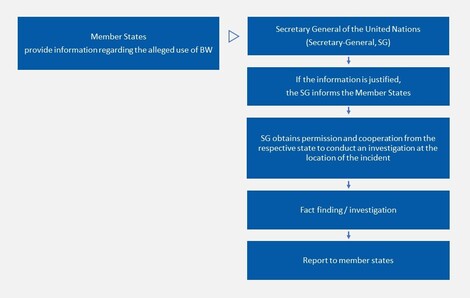
Illustration of the United Nations Secretary-General's Mechanism (UNSGM) for Investigating Suspected Use of Biological, Chemical or Toxicological Weapons.
The concept is to commission individual experts from different professional groups and laboratories on the roster to conduct the fact-finding. They are expected to work together as part of a multinational team with specific subtasks. It is to be expected that the team may be confronted with the fact that the existing level of knowledge and training differs or that the experts work on the basis of different national procedures and guidelines.
In order to prepare the experts and laboratories for a possible incident, the United Nations Office for Disarmament Affairs (UNODA) is working with Member States to continuously develop an overview of the required training topics and to adapt it to the current needs. UNODA coordinates the measures so that a wide range of workshops and training courses can be held that cover a broad spectrum and build on each other.
The first training course of its kind for experts worldwide was held in Sweden in 2009; a second course of this kind was offered by France in 2012. In addition to Germany, a number of other Member States, including France, the United Kingdom, Canada, Portugal, Sweden, Switzerland, South Africa and the United States, strengthen the UNSGM by hosting training courses, exercises and workshops.
Involvement of the Robert Koch Institute
The Robert Koch Institute (RKI) is the central institution of the German federal government in the field of disease surveillance and prevention and thus also in the field of application and measure-oriented biomedical research. One of the institute's tasks is to recognize biological hazards caused by accidents or intentional release, as well as natural outbreaks of highly pathogenic and bioterrorism-related agents.
At the international level, the Robert Koch Institute is committed to the UNSGM under the auspices of the Federal Foreign Office. This happens in close cooperation with UNODA, on the one hand, by organizing and conducting various training courses for the UNSGM-nominated biological weapons experts and, on the other hand, by strengthening the laboratory network and the corresponding laboratory capacities in the field of virology, bacteriology and toxicology (see RefBio - German Contribution to Strengthening the Reference Laboratories Bio in the UNSGM).
As part of the UNSGM project to strengthen nominated biological weapons experts, the RKI engages in the UNSGM network and exchange and offers various training modules and simulation exercises in line with current needs.
Training modules
E-learning on the topic of personal protective equipment
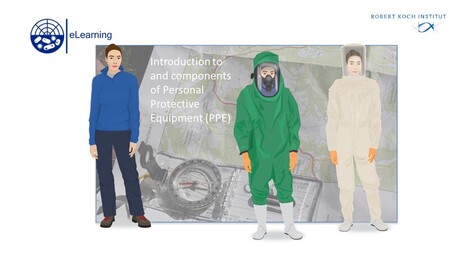
As part of the project, an e-learning module on personal protective equipment (PPE) was developed in 2021. The module 'Staying safe on missions with infectious threats – Introduction to and components of Personal Protective Equipment' provides an introduction to the topic of PPE with a focus on its possible use against biological hazards. In addition to imparting basic knowledge, the aim is to raise awareness of the topic. It is not intended to replace practical training or exercises, but should be seen as the first element of a multi-level learning approach for UN experts. The digital form allows for unrestricted access for the UN experts.
Security training for UN experts
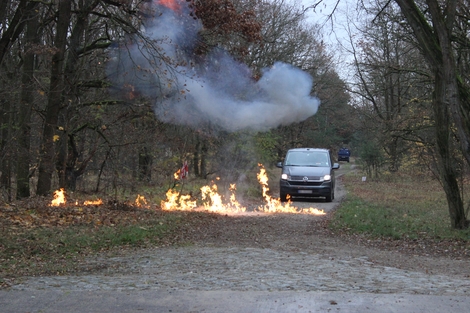
It has been obvious not only since the last UNSGM mission to Syria in 2013 that a fact-finding mission can be very challenging physically and mentally for the experts due to various security risks. In order to prepare the experts nominated for the UNSGM for such situations in the best possible way and to show them options for action, they should undergo a so-called HEAT course (Hostile Environment Awareness Training) or similar. The modules of this training are aligned with the UN's requirements and guidelines for forces deployed abroad. The training took place from September 15 to 20, 2019 in Bad Neuenahr-Ahrweiler/Baumholder and was attended by 17 international experts from various fields, as well as representatives of the World Health Organization (WHO) and the Organization for the Prohibition of Chemical Weapons (OPCW). The training was organized by the Academy for Crisis Management, Emergency Planning and Civil Protection, now the Federal Academy for Population Protection and Civil Defense (BABZ). Using theoretical and practical elements, the participants were sensitized to potential risks in the field and familiarized with appropriate measures and techniques for dealing with those risks. The participants were confronted with various scenarios which required the application of the learned material, with team work playing a central role.
Another security training was conducted in close cooperation with the BABZ for UNSGM experts in Berlin from 15 to 19 November 2021 as a HEAT refresher course.
Training on "Sampling and transportation of infectious and toxic substances"
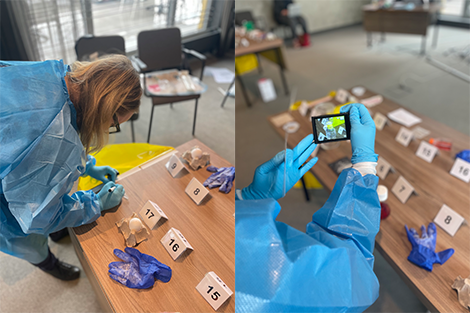
An essential part of a possible mission in the UNSGM context is the collection of conclusive evidence. This includes, among other things, the collection of biomedical and environmental samples, which would be examined intensively in UN-listed laboratories with regard to the suspected pathogen/agent and its origin.
As part of the project, the RKI offered a training course consisting of the modules "Sampling" and "Transport of infectious substances" from September 19 to 23, 2023, in the Berlin area. 17 international experts took part. The module "sampling" for the collection of samples within the framework of the UNSGM was led by partners of the Public Health Agency of Canada and gave the participants an overview of sampling strategies and techniques. A so-called Table Top Exercise (TTX) for planning sampling based on a scenario, as well as practical exercises, offered the opportunity to deepen knowledge. In the module "transport of infectious substances", a certified trainer from the International Air Transport Association (IATA) taught legal requirements and regulations for the safe packaging and shipping of potentially infectious material. Participants were able to complete the course with a written exam and, if they passed, received a certificate valid for two years that qualifies them to ship samples internationally according to the IATA standard.
In 2024, the training course took place again (September 17-20, 2023) with the two modules in cooperation with the above-mentioned partners. The course was expanded to include the aspect of "transport of toxins", since these can also be the subject of a possible investigation in addition to infectious substances. The course on "Sampling and transport of infectious and toxic substances" was attended by 14 UN experts from 12 different countries.
Basic training for UN experts
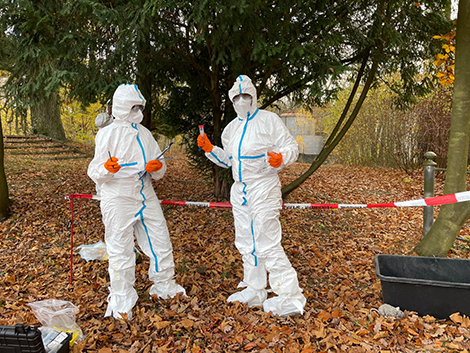
In close cooperation with UNODA, the RKI organized a so-called "UNSGM Basic Training" course in Germany for the first time in 2024. The intensive, two-week training course for nominated UN experts first introduced the basics of the mechanism, involved actors (mainly the UN and laboratories), as well as the range of tasks and mandate in the event of a deployment to investigate a possible use of biological weapons. UN representatives also provided content on operational security, intercultural awareness and communication strategies. Participants received an overview of various technical aspects of an investigation, such as personal protective equipment, the collection of biological samples and decontamination options. Since the questioning of eyewitnesses or victims, for example, can also provide valuable information, participants were also trained in the basics of conducting interviews. During a one-and-a-half-day simulation exercise based on a fictitious biological weapons attack, the participants had the opportunity to apply what they had learned and, divided into two teams, plan their mission, carry it out in practice and present their results. In addition to technical knowledge and skills, social and leadership skills were also required.
The UNSGM Basic Training course took place in Berlin from November 4 to 15, 2020, and was attended by 16 UN experts from 15 countries. The course was supported by the French Military Research Institute (IRBA) and the French Directorate-General for Armed Forces (DGA); the Portuguese Army's Biological and Chemical Defense Military Laboratory Unit; and financially by the German Federal Foreign Office, the European Union and the Government of Canada.
Simulation exercises for the UNSGM
At the end of various training units, the UN experts ideally complete a simulation exercise to apply their knowledge and identify any further training needs.
Exercise on the "Functional Subunit" Approach 2014
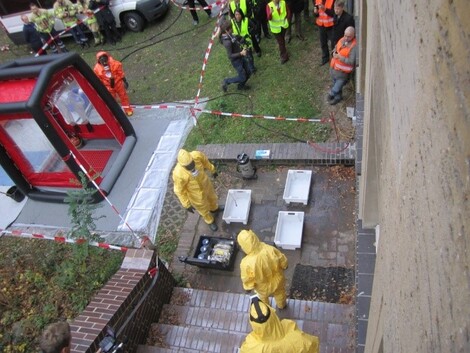
The first UNSGM simulation exercise was organized by the RKI on behalf of the German Federal Foreign Office in November 2014 in Berlin. It was a 10-day field exercise to investigate a fictitious suspected use of biological weapons after the UNSGM had been activated. The main objective of the exercise was to gain practical experience with the so-called "functional subunit (FS)" approach proposed by Denmark and to train cooperation between the individual units of an investigation team. FSs are small teams, ideally consisting of two to five people, that contribute selected functions and skills to the implementation of an investigation under the UNSGM.
Capstone Exercise 2020/2022
The following UNSGM simulation exercise, the so-called Capstone Exercise, was also carried out by the RKI on behalf of the Federal Foreign Office. The focus was on the cooperation within the mission team and with relevant stakeholders. The skills achieved by the biological weapons experts were to be applied in the most practical way. To this end, A UNSGM mission was simulated in the form of a two-part exercise: a table-top exercise (TTX) conducted in November 2020 represented the planning phase of the subsequent field exercise in September 2022. A scenario was developed that took place in a fictitious UN Member State in which an infectious disease with severe symptoms had broken out. The mission team's mandate was to investigate the possible use of biological weapons. Both phases of the exercise were professionally monitored by a Swedish evaluation team and an international team of observers. Read the short version of the report here.
The Table Top Exercise
The planning phase of the mission took place from November 9 to 13, 2020, in the form of a so-called "Table Top Exercise". This format generally serves as a discussion forum to define responsibilities and tasks, for example in the area of emergency management. Due to pandemic-related restrictions, the TTX was conducted virtually, which allowed for broad participation from an expert audience in various countries. During the TTX, a four-person team consisting of UNSGM experts drew up a detailed mission plan, which included planning the team composition, equipment, interviews and sample collection. The results were discussed with UNSGM stakeholders from the United Nations and reference laboratories in the group of attendees.
The field exercise
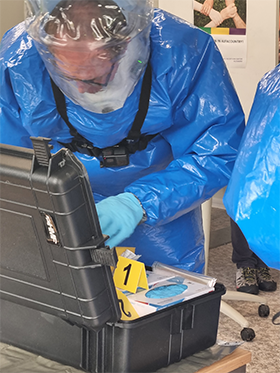
The operational plan developed in the TTX served as the basis for the practical investigations in the field. After a pandemic-related delay, this part of the Capstone Exercise took place in Berlin from September 19 to 28, 2022. A team of 19 experts was deployed to the fictitious affected country to investigate the use of biological weapons. The core elements of such a mission initially include negotiations on activities and modalities on the ground, the collection and securing of environmental and biomedical samples, and conducting interviews with relevant actors (witnesses, victims, representatives of international organizations on the ground, etc.). A virtual platform was used for interactive exchange with UN partners, participating laboratories or representatives of the affected country. On the basis of the facts collected, the mission team wrote a report on behalf of the United Nations. The ten-day field exercise was very complex in its requirements and confronted the team with increasingly difficult conditions. Therefore, in comparison to training or workshops, the exercise should be seen as a stress test and is very challenging both mentally and physically.
A total of up to 70 people were involved in the Capstone Exercise, including the nominated experts, UNODA and WHO, international observers, role players and the RKI organizational team. A final evaluation report, prepared by international observers and the Swedish Defence Research Agency (FOI), identified valuable assessments, needs and recommendations for action for the UNSGM.
Exercise scenarios
As part of various network activities, the UNSGM project team has provided support with exercise scenarios, for example:
- TTX for planning a UNSGM mission at the „G7 Global Partnership Conference on Current Biosecurity Challenges", October 2022, Berlin
- Field exercise with practical elements such as mission planning, sampling and conducting interviews at the UNSGM Basic Training course, October 2023, France
